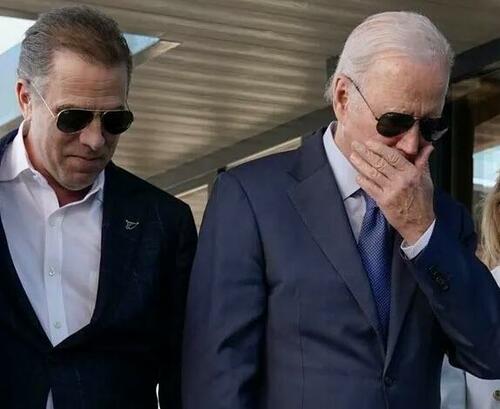
Authored by J. Peder Zane via RealClearPolitics.com,
The New York Times is incredible. Most journalists find it hard enough just to communicate what they know and how they know it in plain English.
But Times reporters and editors go above and beyond. Who, what, when, where, how, and why are just the starting point. They take on the added challenge of shaping and shifting their language with remarkable skill to create articles that are somehow simultaneously honest and deceitful. That extra layer of attention allows them to claim they report truths that are inconvenient to their progressive causes, while defusing their impact. This is so hard to do that the Times often ignores political stories because spin is even beyond their talents – which achieves the same dampening effect. Because for millions of Americans, it didn’t happen if the Times didn’t report it.
Luke Broadwater and his editors delivered a master class in the art of devious reporting last week in an article that put the lie to President Biden’s repeated claims that he has never even discussed his son Hunter’s foreign business deals.
Broadwater’s Aug. 4 article reported that Hunter’s former business partner, Devon Archer, had told Congress that Joe Biden had “repeatedly allowed himself to be in the presence ‒ either physically or by phone ‒ of business associates of his son’s who were apparently seeking connections and influence inside the United States government” – while Joe served as Barack Obama’s vice president.
The article noted that Archer told Congress “the elder Mr. Biden never actually got involved” in business details, but it also explained that was unnecessary. In a follow-up interview with Tucker Carlson, Broadwater reported, Archer had said that while “there was not business content in these conversations” the purpose was “the idea of signals and influence.” The prize,” Archer explained, “is enough in speaking or hearing or knowing you have that proximity to power.”
I am the vice president of the United States. I’m here. I hear you. Keep paying my son.
Archer directly contradicted Joe Biden’s claims of ignorance regarding his son’s shady dealings, Broadwater reported, saying “he believed it was false for defenders of President Biden to say that he had no knowledge of his son’s business activities. ‘He was aware of Hunter’s business,’ said Mr. Archer, who played golf with both Bidens. ‘He met with Hunter’s business partners.’”
Mr. Archer went further, the Times reported, echoing Hunter’s sales pitch to clients that they were not just getting in business with him but the Biden family. This paid real dividends for at least one entity, the Ukrainian gas company Burisma, which paid Hunter $83,000 a month to serve on its board. Archer “believed Burisma as a company stayed in business through tough times through its associations with influential figures in Washington, and the ‘brand’ that Hunter Biden brought to the board.”
Of course, none of this was news to those who read outside the left’s echo chamber. But given the Times’ position as the ultimate arbiter of truth for the liberal elite, these were startling admissions. Game, set, and match, right? When the Times acknowledges that the president has been lying to the public for years about his direct involvement in an influence peddling scheme based on his high office, talk should turn to impeachment and resignation.
And yet, Broadwater and his editors expertly declawed those damning revelations by casting the evidence of Joe’s corruption as proof of GOP perfidy. This effort hinges on the expectation that most people will not read news stories very closely. Their understanding of an article is largely shaped by the headline and the opening paragraphs, which frame the way readers interpret all that follows. An immensely consequential example of this was the headline on the Politico article published just days before the 2020 election regarding Hunter’s laptop: “Hunter Biden story is Russian disinfo, dozens of former intel officials say.” It did not matter that the article itself was filled with significant caveats, reporting that the officials had not seen the laptop and possessed no proof of Russian involvement. The headline defined the narrative.
Similarly, the headline on Broadwater’s article dismissed Archer’s testimony as a partisan nothingburger: “Key Witness Doesn’t Back Up G.O.P.’s Biggest Allegations on Bidens.”
The first five paragraphs of the article ignore the evidence of the president’s lies and corruption to frame Archer’s testimony as proof of GOP overreach – a common journalistic maneuver known as “Republicans pounce.”
“Republicans who for months have accused President Biden without proof of crime and corruption thought that a former business partner of his son’s could be the key to finally substantiating their most serious allegations...
But the testimony this week of Mr. Archer, a former Yale lacrosse player who has been convicted of federal tax charges, fell well short of that, shooting down a bribery allegation Republicans have long promoted and generally rejecting the idea that the elder Mr. Biden had any material involvement in his son’s business dealings. It was the latest instance of House Republicans promising far more than they could produce in terms of proof of their allegations against the president.”
Thus, the Times sets readers up to believe the key issue is what Archer could not substantiate – reports of bribes, which he may not have been privy to – rather than his eyewitness testimony of the president’s malfeasance. This creates a context in which Archer’s damning revelations are simply part of an epic fail.
While the headline and opening of an article have the most impact on reader perception – psychologists calls this the “primacy effect” – the end of an article is also crucial in constructing a lasting impression of the facts. In his kicker, Broadwater once again works to diminish the facts he has reported by repeating Democrat Rep. Dan Goldman’s question to Archer of whether it was “fair to say that Hunter Biden was selling the illusion of access to his father.” Mr. Archer responded, “Yes.”
While Broadwater ends his piece there, Archer, in fact, equivocated slightly, describing Goldman’s characterization as “almost fair” because Hunter did, in fact, provide direct access to his father through dinners, meet and greets, and phone calls. “Because there ‒ there is ‒ there are touch points and contact points that I can't deny that happened,” Archer explained, “but nothing of material was discussed. But I can't go on record saying that there was ‒ there was communications” between Joe and Hunter’s business partners.
The illusion, of course, is that Archer’s testimony vindicated Biden. The evidence shows that nothing could be further from the truth – except, incredibly, in the pages of the New York Times.
Authored by J. Peder Zane via RealClearPolitics.com,
The New York Times is incredible. Most journalists find it hard enough just to communicate what they know and how they know it in plain English.
But Times reporters and editors go above and beyond. Who, what, when, where, how, and why are just the starting point. They take on the added challenge of shaping and shifting their language with remarkable skill to create articles that are somehow simultaneously honest and deceitful. That extra layer of attention allows them to claim they report truths that are inconvenient to their progressive causes, while defusing their impact. This is so hard to do that the Times often ignores political stories because spin is even beyond their talents – which achieves the same dampening effect. Because for millions of Americans, it didn’t happen if the Times didn’t report it.
Luke Broadwater and his editors delivered a master class in the art of devious reporting last week in an article that put the lie to President Biden’s repeated claims that he has never even discussed his son Hunter’s foreign business deals.
Broadwater’s Aug. 4 article reported that Hunter’s former business partner, Devon Archer, had told Congress that Joe Biden had “repeatedly allowed himself to be in the presence ‒ either physically or by phone ‒ of business associates of his son’s who were apparently seeking connections and influence inside the United States government” – while Joe served as Barack Obama’s vice president.
The article noted that Archer told Congress “the elder Mr. Biden never actually got involved” in business details, but it also explained that was unnecessary. In a follow-up interview with Tucker Carlson, Broadwater reported, Archer had said that while “there was not business content in these conversations” the purpose was “the idea of signals and influence.” The prize,” Archer explained, “is enough in speaking or hearing or knowing you have that proximity to power.”
I am the vice president of the United States. I’m here. I hear you. Keep paying my son.
Archer directly contradicted Joe Biden’s claims of ignorance regarding his son’s shady dealings, Broadwater reported, saying “he believed it was false for defenders of President Biden to say that he had no knowledge of his son’s business activities. ‘He was aware of Hunter’s business,’ said Mr. Archer, who played golf with both Bidens. ‘He met with Hunter’s business partners.’”
Mr. Archer went further, the Times reported, echoing Hunter’s sales pitch to clients that they were not just getting in business with him but the Biden family. This paid real dividends for at least one entity, the Ukrainian gas company Burisma, which paid Hunter $83,000 a month to serve on its board. Archer “believed Burisma as a company stayed in business through tough times through its associations with influential figures in Washington, and the ‘brand’ that Hunter Biden brought to the board.”
Of course, none of this was news to those who read outside the left’s echo chamber. But given the Times’ position as the ultimate arbiter of truth for the liberal elite, these were startling admissions. Game, set, and match, right? When the Times acknowledges that the president has been lying to the public for years about his direct involvement in an influence peddling scheme based on his high office, talk should turn to impeachment and resignation.
And yet, Broadwater and his editors expertly declawed those damning revelations by casting the evidence of Joe’s corruption as proof of GOP perfidy. This effort hinges on the expectation that most people will not read news stories very closely. Their understanding of an article is largely shaped by the headline and the opening paragraphs, which frame the way readers interpret all that follows. An immensely consequential example of this was the headline on the Politico article published just days before the 2020 election regarding Hunter’s laptop: “Hunter Biden story is Russian disinfo, dozens of former intel officials say.” It did not matter that the article itself was filled with significant caveats, reporting that the officials had not seen the laptop and possessed no proof of Russian involvement. The headline defined the narrative.
Similarly, the headline on Broadwater’s article dismissed Archer’s testimony as a partisan nothingburger: “Key Witness Doesn’t Back Up G.O.P.’s Biggest Allegations on Bidens.”
The first five paragraphs of the article ignore the evidence of the president’s lies and corruption to frame Archer’s testimony as proof of GOP overreach – a common journalistic maneuver known as “Republicans pounce.”
“Republicans who for months have accused President Biden without proof of crime and corruption thought that a former business partner of his son’s could be the key to finally substantiating their most serious allegations…
But the testimony this week of Mr. Archer, a former Yale lacrosse player who has been convicted of federal tax charges, fell well short of that, shooting down a bribery allegation Republicans have long promoted and generally rejecting the idea that the elder Mr. Biden had any material involvement in his son’s business dealings. It was the latest instance of House Republicans promising far more than they could produce in terms of proof of their allegations against the president.”
Thus, the Times sets readers up to believe the key issue is what Archer could not substantiate – reports of bribes, which he may not have been privy to – rather than his eyewitness testimony of the president’s malfeasance. This creates a context in which Archer’s damning revelations are simply part of an epic fail.
While the headline and opening of an article have the most impact on reader perception – psychologists calls this the “primacy effect” – the end of an article is also crucial in constructing a lasting impression of the facts. In his kicker, Broadwater once again works to diminish the facts he has reported by repeating Democrat Rep. Dan Goldman’s question to Archer of whether it was “fair to say that Hunter Biden was selling the illusion of access to his father.” Mr. Archer responded, “Yes.”
While Broadwater ends his piece there, Archer, in fact, equivocated slightly, describing Goldman’s characterization as “almost fair” because Hunter did, in fact, provide direct access to his father through dinners, meet and greets, and phone calls. “Because there ‒ there is ‒ there are touch points and contact points that I can’t deny that happened,” Archer explained, “but nothing of material was discussed. But I can’t go on record saying that there was ‒ there was communications” between Joe and Hunter’s business partners.
The illusion, of course, is that Archer’s testimony vindicated Biden. The evidence shows that nothing could be further from the truth – except, incredibly, in the pages of the New York Times.
Loading…




